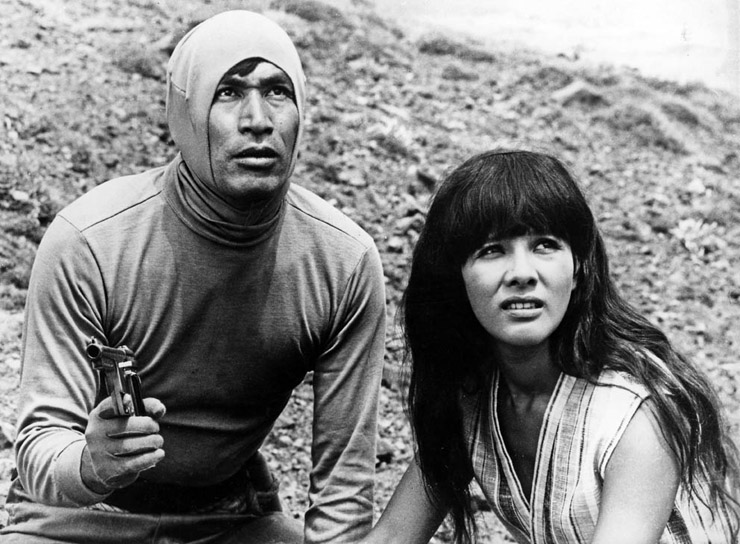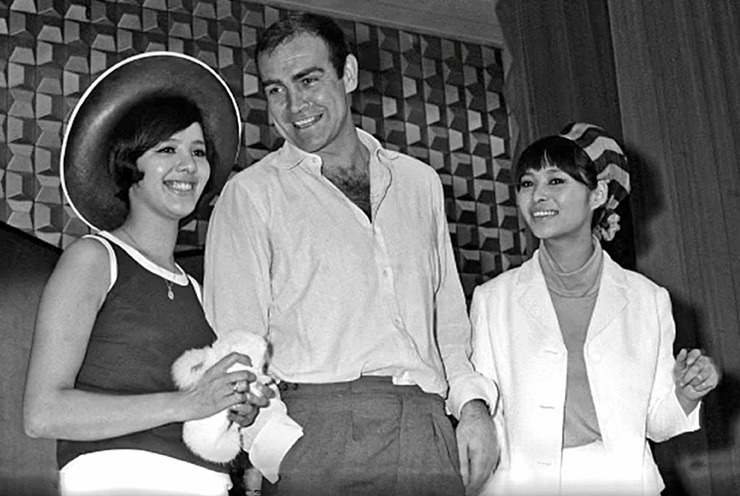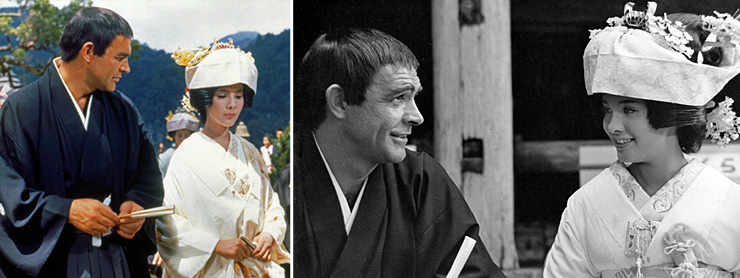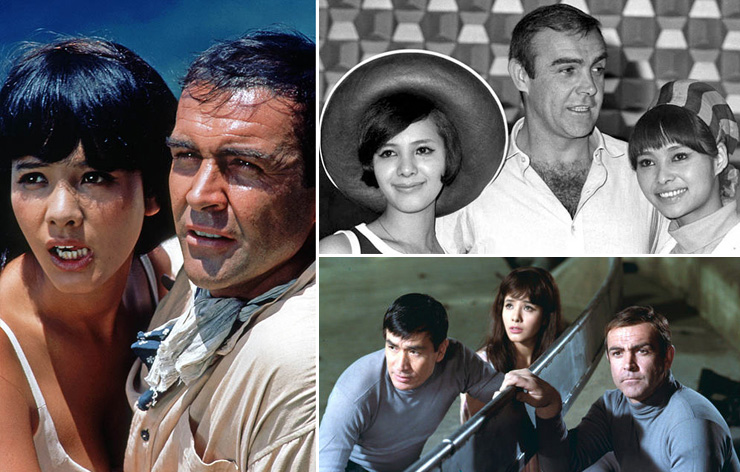|
When EON Productions set about casting You Only Live Twice,
Japanese actor Tetsuro Tamba – who had already worked for director Lewis
Gilbert in 1964 drama The 7th Dawn – proved an important sounding
board in selecting Hama and Wakabayashi for the two major ‘Bond girl’
roles in Roald Dahl’s screenplay – Ama diving girl Kissy Suzuki and
Japanese secret service agent Suki (as the character was originally
named).
Subsequently, Tamba was also cast in the film as Tiger Tanaka, a role
originally offered and refused by Toshiro Mifune, an actor renowned for
his collaborations with legendary Japanese helmer Akiro Kurosawa, who
instead opted to appear in John Frankenheimer’s motor racing drama
Grand Prix.

Tamba apparently recommended Hama and Wakabayashi because he felt they
would pick up English pretty quickly, as well as for their photogenic
qualities.
However Hama, who had often agonised during her years in Japanese cinema
about whether to remain in showbusiness, soon struggled with the attention
that being a part of the 007 franchise entailed.
“I had never seen a 007 movie, and had no idea 007 was such a huge
international hit,” she later told the New York Times, revealing
that a member of the studio and production team told her on her arrival in
London: “You’re a Bond girl now. The clothes you wear, the jewellery you
put on, we will manage all of that.”
“Everything from my weight to the height of my heels was decided,” Hama
added. “It may have looked glamorous, but for me, it was all a huge
ordeal.”
These comments echo
Hama’s words which appeared in press materials when You Only Live Twice
was originally released: "I was simply terrified when I was first given
the part – the Bond films are the most popular ever to play in Japan and
all my friends told me that the eyes of the world were upon me. Suddenly
I'm on my way to England to appear with Sean Connery in utter strange
surroundings.”

Today, it is almost impossible to imagine the attention that must have
been lavished on Hama and Wakabayashi when they were cast as Bond girls.
When You Only Live Twice was in pre-production, Bond-mania was at
its height, while Japanese actors and actresses, indeed Japanese culture
as a whole, had enjoyed comparatively little exposure in major Hollywood
films. Toshiro Mifune was a familiar face in Hollywood, and the likes of
Eiji Okada had also made some impact in the West, while Frank Sinatra’s
1965 film None But the Brave – a co-production between Warner
Brothers and Toho – used several Japanese actors – however the 007 series’
incursion into Japan represented a whole new level of exposure and media
attention for the local actors and actresses involved.
Then, as today, Hama emphasised the support and kindness that was shown to
her by Sean Connery as she dealt with her new-found fame. “I am grateful
to him for his kindness,” she said in 1967. “Although I only understood a
few words of what he said I didn't need language to appreciate his
charming manner."
To the New York Times in 2017 she added: “Every morning, he
[Connery] asked if I was having any trouble. He also had a tough life
before becoming a star, so he understood me.”

Adding to Hama’s unhappiness during the production of You Only Live
Twice was the fact that she struggled to pick up English. According to
director Lewis Gilbert this led to an unexpectedly dramatic situation.
His account of Hama and Wakabayashi’s casting appeared in his 2010 memoirs
All My Flashbacks:
“Two actresses were
chosen after that day’s work in the studio, Akiko Wakabayashi and Mie
Hama. Neither spoke English. The best thing we could do for them, we
thought, was send them to live with two English families where there
were children. Conversation would be non-stop and simple. For three
months the two actresses stayed in England, at the end of which we made
another test, this time in English. My old writing colleague Vernon
Harris, an ex-actor, cued them in. Akiko was fine. She could not only
say the words, she could make sense of them. Mie was another matter. The
three months had evidently been a struggle for her. Firstly, she
couldn’t understand me, and when she spoke she was incomprehensible. She
could make no sense of the dialogue at all. As shooting of the film was
soon to start we were facing a big problem.
I went to Cubby and Harry to explain the hopelessness of the Mie
situation. She would have to go home. “Yes, but how do we tell her?”
they said. It was going to need delicate handling and none of us spoke
Japanese. My suggestion was to ask Tetsuro Tamba. It was the only way
out. He was with us in London and he could talk to Mie.
“Good idea, good idea,” said Harry and Cubby, relieved to be shot of the
problem, not that it was a problem Tamba wanted either. “That’s serious,
very serious,” he said.
“But could you not explain to Mie that it would do her no good to give a
bad performance in a Bond film? It would be bad for us and bad for her,”
I said.
“I’ll take her to dinner,” said Tamba. “I don’t know what I can do but
I’ll try.”
The next morning, I rushed in to see him. What had happened? “Straight
to the point,” said Tamba, “if you insist Mie goes back, tonight she
will jump out of her window at The Dorchester Hotel and commit suicide.”
“What!” I said, “You’re joking.”
“No,” said Tamba, “you have to understand face-saving in Japan. It is
most important. You have a girl who has been sent to England to be in
the biggest film ever made in Japan and everybody in her country knows.
If you send her back, you are saying she is no good. So, for her, the
only way to save face is to commit suicide.”
This was indeed serious, and it was not up to me to make a decision off
my own bat. The producers had to be told.
“What happened with Mie? What did she say?” asked Harry and Cubby when I
went to see them.
“Sit down,” I said. “The news is not good.” Actually I was quite
enjoying myself. The two of them were always dumping problems in my lap.
Now it was my turn to dump a problem in theirs. I told them of Mie’s
threat to jump out of her window at The Dorchester, concluding with, “It
would make a splash in England and an even bigger splash in Japan,”
which I thought was rather funny. Cubby and Harry did not.
“What shall we do?” they asked.
“If Mie does what she says she will do,” I answered, “that’s the end of
the film because you’ll never get to make it in Japan and you can’t make
it anywhere else. It’s that simple. So, we keep her and either carry on
in the hope that her English improves or we revoice her at the end of
the shoot and live with it.”
In the event, several months later, the latter is what happened. Skilled
voice artiste Nikki van der Zyl, who had revoiced other Bond girls,
listened to a Japanese speaking English and came up with an accent that
sounded Japanese but had useful inflections.”
What Gilbert does not
mention, is that the roles earmarked for Hama and Wakabayashi were also
switched to make the filmmakers’ post-synching easier – with Akiko taking
on the more dialogue heavy role of Suki (which was then renamed Aki) and
Hama shifted to the role of Kissy.
Hama herself has never spoken about Gilbert’s claim, although Wakabayashi
did briefly give Vaquer and Homenick her recollections of the casting
switch:
“Of course it was the director's decision. I was given the role of Kissy
after an interview and a screen test in Japan (though it was a temporary
decision). But when we read through the script in London, the roles were
switched round. The name of the role was originally Suki, but it was
changed to Aki as it sounded close to my name.”

Ultimately, Hama’s struggles with English led to her being revoiced, while
Wakabayashi’s voice performance, remarkably – given the fact she spoke no
English when originally cast, and given how often other 60s Bond girls
were dubbed – made it to the final cut.
Like Hama, Wakabayashi spoke fondly of co-star Connery, telling Vaquer and
Homenick: “James Bond in the movie is a ladies' man, but Sean-san is a
warm-hearted, honest man.
He has a clear vision as
an actor. He can be stubborn from time to time, but he is a real man with
a bit of old-fashioned taste.” |